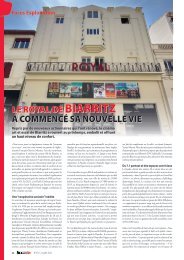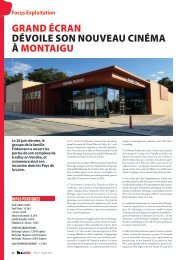Create successful ePaper yourself
Turn your PDF publications into a flip-book with our unique Google optimized e-Paper software.
HOPES HIGH, THEN BOG DOWN<br />
IN BRITISH TAX CONVERSATIONS<br />
U.S. Is Insistent Upon<br />
Getting a Substantial<br />
Return of Receipts<br />
LONDON—Negotiations for a settlement of<br />
the Anglo-American film impasse brought on<br />
by the 75 per cent import tax got under way<br />
here last Monday with a flourish and then<br />
began to show signs of bogging down by<br />
Thursday.<br />
At that point, the Americans were still insisting<br />
they were not going to pay the tax,<br />
that they had to have a substantial percentage<br />
of their receipts for transfer to this country,<br />
and that whatever funds were to be<br />
blocked in England would be eligible for investment<br />
there or for purchase of exportable<br />
goods.<br />
BRITISH FOR SOME COMPROMISE<br />
British exhibitors and leading distributors<br />
were for some form of compromise to prevent<br />
theatres from going into bankruptcy when<br />
they run out of film, but there were rumors<br />
of a division of sentiment in government<br />
circles, with Sir Stafford Cripps insisting on<br />
no compromise.<br />
With the first session was a top level conference<br />
at the Board of Trade with Eric Johnston,<br />
MPAA head: Allen Dulles, MPAA counsel;<br />
Lewis O. Douglas, American ambassador;<br />
Joyce O'Hara, executive assistant to Johnston;<br />
F. W. Allport of the MPAA, and James<br />
A. Mulvey, president of Samuel Goldwyn<br />
Productions, sitting on the U.S. side of the<br />
table and Ernest Bevin. British foreign mininster:<br />
Sir Stafford Cripps, chancellor of the<br />
exchequer, and Harold Wilson, president of<br />
the Board of Trade, representing the British<br />
government.<br />
Mulvey was present as a representative of<br />
the Society of Independent Motion Picture<br />
Producers.<br />
The following day the negotiations were<br />
taken over by committees, with Johnston,<br />
Dulles and Mulvey and Allport doing most<br />
of the talking for the Americans and Wilson<br />
sitting in for the British.<br />
LUNCH WITH U.S. OFFICIALS<br />
Johnston took time out to meet the heads<br />
of American companies in<br />
Great Britain and<br />
to have lunch with J. Arthur Rank, Nate J.<br />
Blumberg, Joseph H. Seidelman, J. Cheever<br />
Cowdin and Charles Prutzman of Universal-<br />
International, who were here for discussion<br />
of a new distribution deal with Rank.<br />
Johnston and other members of his party<br />
and Ambassador Douglas let it be known that<br />
they had Friday reservations for a quick trip<br />
back to the United States. This may have<br />
been to create the impression they expected<br />
a quick end to the conferences.<br />
On the British side, window dressing appeared,<br />
apparently to convince the public the<br />
government was getting tough.<br />
Tom O'Brien, MP and general secretary of<br />
the NATKE as well as a leader in the Labor<br />
party, publicly congratulated Foreign Secretary<br />
Bevin and asked him to "strain every<br />
effort" to prevent a breakdown.<br />
Almost immediately, an unnamed spokesman,<br />
presumably Sir Stafford Cripps, stated<br />
Rank's 40 Features for '48<br />
Reach Production Top<br />
NEW YORK—Most British studios, with<br />
the exception of those controlled by American<br />
companies, are working at capacity, and it<br />
is doubtful if the industry can increase production<br />
over the 1948 level, according to<br />
George Archibald, managing director of Independent<br />
Producers, Ltd., Rank production<br />
unit.<br />
The Rank units will turn out 40 features<br />
this year, an increase of 12 over 1947, Archibald<br />
said. He doesn't believe this can be<br />
stepped up any more unless more studio<br />
space is available. Towar-d this end, Ai-chibald<br />
sees little chance that the British government<br />
will gi-ant construction permits to<br />
the industry within the next few years.<br />
Archibald arrived from England Wednesday<br />
(3). He plans to visit U-I and Eagle<br />
Lion exchanges and study reaction to Rank<br />
product. He will map releasing plans on new<br />
British, films with executives of both companies.<br />
He will return to England on the<br />
27th.<br />
Archibald said the present budget of $36,-<br />
000,000-$40,000,000 plarmed for Rank films<br />
during 1948 is two and one-haJf times larger<br />
than the 1946 production budget. He denied<br />
reports that Rank was hmiting film budgets.<br />
We do not intend to cut the quality of films,<br />
he stated.<br />
Archibald contends the British industi'y<br />
cannot survive without making a number<br />
of big productions. He also feels the British<br />
industry cannot succeed in the American<br />
market, if films are slanted toward American<br />
audiences. "When tliis is done, the film seems<br />
always to strike a false note," he declared.<br />
Concerning a speedup in shooting schedules,<br />
Ai-ohibald said the Gainsborough and<br />
Denham studios in England have managed<br />
to cut shooting time. His own group, which<br />
films at Pinewood, has not been as successful.<br />
All Rank units axe attempting to cut<br />
shooting time by rehearsing casts for longer<br />
takes, however.<br />
emphatically that the government could not<br />
drop the tax. This was followed by gene^pl<br />
acceptance of a story that Bevin and Cripps,<br />
the latter, the great exponent of austerity, had<br />
split on the issue, because it had reached<br />
the stage where international relations were<br />
involved.<br />
Mono French Deal in Work<br />
PARIS—William Satori, Monogram continental<br />
European representative, has arrived<br />
here to arrange a new releasing deal<br />
with the company distributor in France,<br />
Interfrance Films, S.A.R.L. Before arriving<br />
in Paris, Satori visited Brussels and Copenhagen<br />
to set up Monogram 16mm release.<br />
Korda Gets $1,500,000<br />
Advance From 20th-Fox<br />
London— Sir Alexander Korda has rereceived<br />
an advance payment of $1,500,000<br />
from 20th Century-Fox for the first three<br />
pictures to be released by the American<br />
company under their recent distribution<br />
deal. This represents the largest lump<br />
sum payment in dollars to be received by<br />
a British film company.<br />
The pictures covered by the payment<br />
are "An Ideal Husband," "Anna Karenina"<br />
and "Mine Own Executioner."<br />
"Husband" is being released in the U.S.<br />
this month by 20th-Fox. The other two<br />
films are scheduled for release during<br />
1948.<br />
At present Archibald's Independent Producers,<br />
Ltd., has three fUms in cutting<br />
"Oliver Twist," "The Red Shoes" in Technicolor<br />
and "Esther Waters." Three others axe<br />
filming. These are: "Dulcimer Street," "The<br />
Blue Lagoon" in Technicolor and a film based<br />
on the H. G. Wells novel, "The Passionate<br />
Friends."<br />
These six will be released this year.<br />
Also on the schedule at Pinewood are:<br />
"Once a Jolly Swagman," "All Over the<br />
Town" and "Fair Stood the Wind for Prance."<br />
Archibald said that British producers find<br />
they can recoup about 60 per cent of the<br />
negative cost on big budget fUms on the domestic<br />
market.<br />
Concerning the U.S. ban on film sihipments,<br />
he believes British theatres can continue<br />
operating for six months with reissues if<br />
there is no tax settlement.<br />
Archibald intends to visit the Cleveland,<br />
Buffalo, Albany, Pittsburgh, Philadelphia<br />
and Washington exchange teiTitories before<br />
returning to England.<br />
U.S.-Sponsored Films Get<br />
An Okay for Foreign Use<br />
WASHINGTON—The House approved an<br />
amendment Thursday paving the way for<br />
distribution in foreign theatres of films<br />
sponsored by the United States information<br />
services. Tlie amendment, offered by Rep.<br />
Karl Stefan (R. Neb.i was adopted unanimously<br />
by the House which considered an<br />
appropriation for the information program.<br />
Stefan said the distribution of films abroad<br />
had been limited to small clubs. The amendment<br />
offers "far-reaching" distribution scope<br />
for films. The theatres could be paid to<br />
show U.S. films under the program, he said.<br />
BOXOFHCE : : March 6, 1948

















